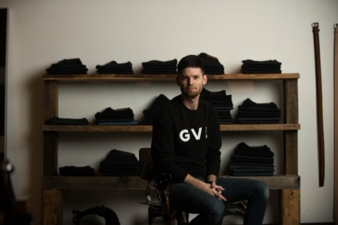13/11/2018 – USA — auf Deutsch lesen
Billiam Jeans
On any given weekday, denim loyalists trickle into a small store in a nondescript strip shopping center in Greenville, S.C.
They come to be measured and fitted for custom-made jeans, or they anxiously wait to pick up their finished product.
This is a regular occurrence at Billiam Jeans, brainchild of 29-year-old entrepreneur Bill Mitchell, who as a senior at Clemson University back in 2009, discovered he had a penchant for making tailored clothing. The shop doubles as Billiam’s factory, where Mitchell and his lone employee laboriously churn out top quality jeans at the rate of about one pair per hour, although they have produced pairs in as little as 38 minutes.
At $250 a pair, Billiam’s jeans aren’t for everyone. As Mitchell describes his clientele, they might be consumers who like locally made products and don’t mind paying extra. Or they’re well heeled with the means to buy the most expensive designer jeans, but instead choose to pay for the experience of buying tailored jeans. There are some who can’t afford to make a snap decision to buy Billiam jeans, but save up for the experience. Some are minimalists who would rather spend more on one high-quality pair, rather than having an array of lower-quality commodity jeans cluttering their closet.
“We like to show people how they are made”
“We like to show people how they are made,” explains Mitchell about the concept of having the factory share space with the retail operation. “Our mindset is that if a pair of jeans costs $250, people are going to know why it costs $250. We show them exactly how many machines it takes to make one pair of jeans (15) and how each machine is different. Some are brand new and do wonderful things, and some are from the 1940s and are historic.”
In addition to his shop, Mitchell sells Billiam jeans online and to wholesalers serving boutique shops mostly in the Southeast. Billiam has also gone international with eight stores in the U.K. carrying the jeans, and stores in South Korea and Japan selling them as well.
Until the end of December, Mitchell sourced his denim from Greensboro-based Cone Mills. However, Cone’s owner, International Textile Group, decided to close the venerable and world-famous plant at the end of 2017, cutting off the supply to Billiam and other boutique jeans makers around the U.S. White Oak was the only plant producing selvage denim in the U.S., using vintage Draper Looms. Mitchell turned to Cone about five years ago, after initially purchasing denim from Liberty Denim, which closed in 2012.
Upon learning the news of the plant’s closing, Mitchell scrambled to maintain his supply line by buying as much of White Oak’s inventory as he could.
“I took about every penny I had in the bank and bought as much denim as I could,” Mitchell says. “The plan was to stock up. We now have material to last us for the next three or four years, and we are as full as we could possibly be. I’ve been nervous that we bought too much and that this is the right move.”
Mitchell laments White Oak’s closing, saying that in addition to putting niche jeans makers in a sourcing bind, it also may stifle the next generation of young entrepreneurs who want to start jeans companies. Long-range, he says Billiam may explore sourcing denim from Mount Vernon, which now operates the last denim mill standing in the U.S., in Trion, GA. In the meantime, Mitchell says he plans to get into the cut-and-sew of T-shirts and sweats.
“We will expand the company basically to include cotton T-shirts, sourcing from U.S. cotton producers with our supply line tracing back to the farm,” he says.
The relationship with Cone evolved over time, and Mitchell worked with the manufacturer to sample new materials. In fact, Mitchell’s affinity for Cone’s denim was so great that a few years ago he purchased the company’s entire library of vintage sample rolls, which took three tractor-trailer loads to bring to Greenville. These five-yard remnants allow Billiam customers to pick out different styles for their customized jeans.
Billiam customers are loyal
Mitchell describes the experience as taking a customer and creating a friend, by giving them an experience they enjoy. Many come back to buy a second or third pair.
Preferring to keep production numbers private, Mitchell says Billiam produced “thousands” of pairs of jeans in 2016, but he notes that production usually ranges from 50 to 150 pairs a week. Production has consistently grown by about 30 percent each year, he says. Mitchell augments his staff with college interns during the summer and says he may also soon add two full-time employees. His current space has room to double in size and he expects to expand soon.
Mitchell offers 300 different kind of material, with about 70 percent being some type of indigo. He also stocks denim in black, gray, white, brown and green.
The jeans journey started during Mitchell’s Clemson days when he noticed how a friend’s clothes fit so well. He asked him where he bought his clothes. His response was that he used a sewing machine to tailor all of his clothes in his basement.
“So I thought, that’s interesting, and I started doing the exact same thing,” Mitchell recalls. I found that I was pretty good at altering clothes. It’s much like putting together puzzles or Legos. I enjoy solving the problem. Then, after I tailored a ton of clothes, I decided I wanted to make some jeans from scratch.”
Mitchell bought a pattern for a pair of jeans, made that first pair, wore it around for a while, and within a year’s time had a waiting list of about 400 people wanting him to make them a pair. So began Billiam Jeans.
John McCurry





